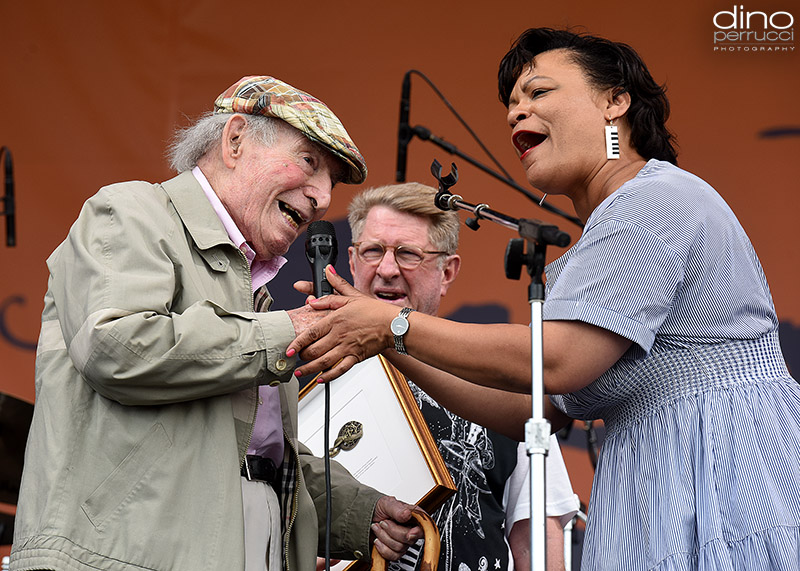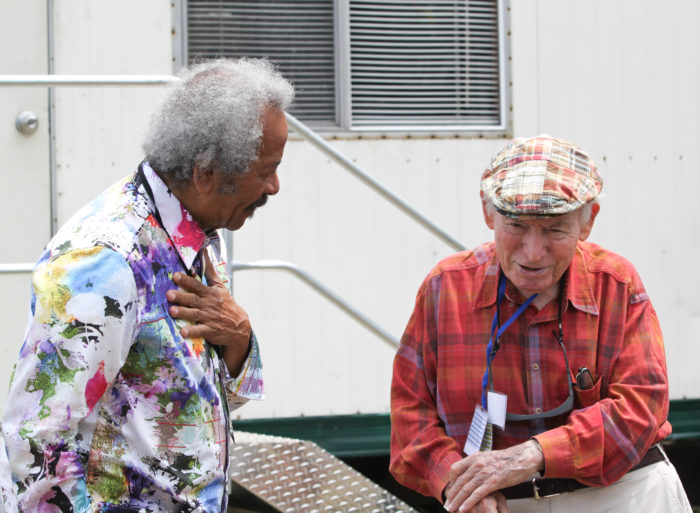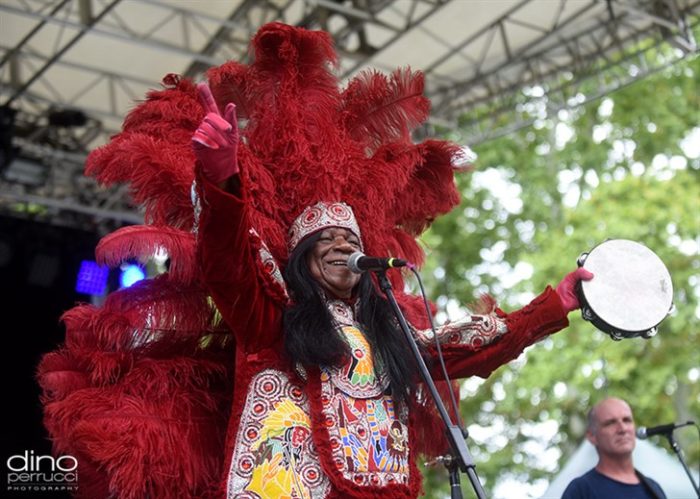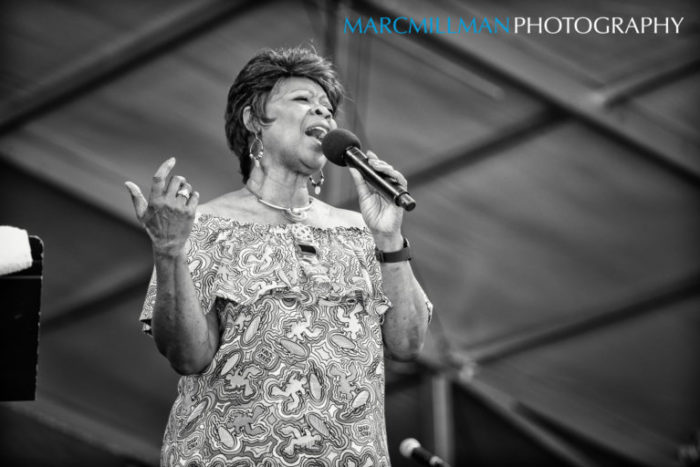50 Years of Jazz Fest: Festival Heritage with George Wein

George Wein receives the key to the city of New Orleans from mayor LaToya Cantrell at Jazz Fest 2019
The founding producer of the New Orleans Jazz & Heritage Festival remembers some of the event’s essential figures.
This article is part of our 50 Years of Jazz Fest celebration and appears in the special Collector’s Edition April/May 2019 issue of Relix. Subscribe here using code NOLA50 and get 20% off.
In 1962, a team of New Orleans community leaders approached George Wein and pitched him on the possibility of creating a music festival in their city. The pianist and festival promoter had launched the Newport Jazz Festival eight years earlier, helping establish a model for similar events across the country. After meeting with officials, Wein concluded that the timing wasn’t right due to the segregation that still divided the city. He recalls, “I never was confrontational. I said, ‘Look, this is your world. If that’s the way you want to live, that’s your problem, but you’re going to have to solve that problem.’”
By April 1970, the situation had changed, as Wein explains in his lively memoir, Myself Among Others: A Life in Music. “With the passing of the Civil Rights Acts of 1964, the South had opened up and there was a desire on the part of Southern cultural establishments to join the mainstream of American art and entertainment.” As a result, the New Orleans Jazz Festival & Louisiana Heritage Fair—as Wein initially dubbed it—debuted in Beauregard Square. (The locale’s original name, Congo Square, has since between restored.) Wein estimates that fewer than 300 people attended; however, he notes, “The formula of multiple stages, and food and crafts booths, still exists today and draws hundreds of thousands of people every year to the Crescent City.”
Here, the event’s founding producer looks back on some of the musicians who are similarly entwined with the festival.

ALLEN TOUSSAINT
To know him was to love him. He was the ultimate Crescent City gentleman. His talent and musicianship, along with his songwriting, influenced every musician in New Orleans.
CLIFTON CHENIER
Cajun music comes out of Lafayette, La., a Southern city where Clifton Chenier’s band broke down racial barriers and brought a new feeling to this beautiful ethnic music.
DAVE BARTHOLOMEW
Dave Bartholomew’s influence on New Orleans music was expressed best by Fats Domino and the amazing appeal it had to all America and the world.
ELLIS MARSALIS
I used to hang out with Ellis in 1969 when I was playing piano at the Royal Sonesta, and Ellis was across the street with Al Hirt. We’ve been friends ever since. Little did I know that he would father a musical family that, in some respects, has taken over the world of jazz.

BIG CHIEF MONK BOUDREAUX
Monk and the Mardi Gras Indians were little known to the general world outside of New Orleans. Their immense creativity brought joy and excitement to the New Orleans Jazz & Heritage Festival, and the world, in general, paid attention to this musical idiom that was pure New Orleans.
FATS DOMINO
Fats came to my house in France once. He saw the piano and immediately sat down and gave us a personal concert that I will never forget. A true original—no one coming out of the New Orleans cultural life that he lived has been able to surpass the success that he had.
HARRY CONNICK JR.
Harry Connick Jr.’s father kept bothering me about this seven-year-old kid who had a lot of talent. I didn’t pay much attention and I’ve been sorry ever since. Harry Connick’s talent—as Duke Ellington would say—is beyond category, as an actor, singer and, especially, a fine jazz pianist.
LOUIS ARMSTRONG
To many people, he is the greatest figure in the history of jazz—a well-deserved recognition. His musical phrasing created the jazz vocabulary that has influenced every musician since. His love of his New Orleans background helped the nation to focus its attention on the Crescent City. It was because of Louis Armstrong that I wanted to go to New Orleans in the first place.
MAHALIA JACKSON
Fifty festivals ago, in 1970, I felt that all the performers should be from New Orleans and Louisiana. I was so happy that we could include Mahalia Jackson in that first festival. To hear her voice singing the gospel was to hear the voice of the angels. There is only one Mahalia.

IRMA THOMAS
Irma Thomas was the best singer in New Orleans when I came to town. And now, 50 years later, she’s still as great as she ever was—a beautiful woman, a wonderful human being and a great artist.
PROFESSOR LONGHAIR
Sitting at a little café on Magazine Street with Quint Davis and Allison Minor, I heard this music on the jukebox: “Go to the Mardi Gras.” Thanks to that, Quint and Allison asked Professor Longhair to play at the Jazz & Heritage Festival, and it brought him back from relative obscurity. Again, he’s a true New Orleans original who influenced an untold number of New Orleans pianists.
DIRTY DOZEN BRASS BAND
Allan Jaffe of Preservation Hall said, “You have to hear this band.” When I heard the Dirty Dozen, I was more than impressed by the creativity that came out of the music of New Orleans. Dirty Dozen established a party-band feeling that created the stream of groups that have followed its pioneering efforts.
This article originally appears in the April/May 2019 issue of Relix. For more features, interviews, album reviews and more, subscribe here.



















